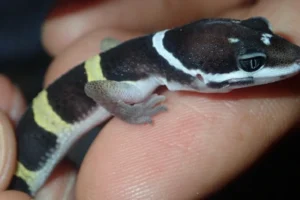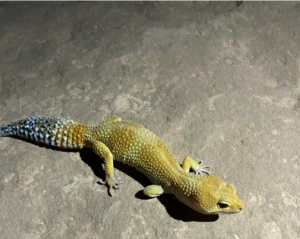You might have noticed your gecko hiding under rocks or in a shaded corner of its tank. It almost looks like it avoids the light completely. But reptiles often need heat from the sun to stay healthy. So what about geckos, do they actually need sunlight?
Yes, geckos need sunlight, but not the same way humans do. They use the heat and invisible UV rays in sunlight to help their bodies work right. Without enough, they can get weak, stop eating, or even develop serious bone problems.
Even though most geckos hide during the day, sunlight is still very important for keeping them healthy and active.
Why Sunlight Is So Important for Geckos
In the wild, geckos live in warm places like deserts, forests, and rocky areas.
Many are active at night, but the warmth they get from the sun during the day helps them survive when it gets cooler later.

Geckos are ectothermic, which means they can’t make their own body heat. They use the sun or warm surfaces to control their temperature.
Basically, the sun works like a little heater for them.
Without enough warmth from sunlight (or a heat lamp indoors), their bodies slow down.
They may not digest food well, and their movements become sluggish.
Do Geckos Need Direct Sunlight?
You might wonder if your gecko should sit in the sun like a turtle. The answer depends on the type of gecko.
-
Diurnal geckos, like day geckos, are active in daylight and benefit from direct sunlight.
-
Nocturnal geckos, like leopard geckos and tokay geckos, come out at night but still need some UV rays from sunlight.
Nocturnal geckos don’t sit directly in the sun, but they still absorb reflected or filtered light from their surroundings.
So your gecko doesn’t have to bask directly, but it still needs sunlight in smaller amounts for good health.
How Sunlight Helps Their Bodies Make Vitamin D3
One of the main reasons geckos need sunlight is Vitamin D3. This vitamin helps them absorb calcium from their food.
Without enough, bones can get weak or bend out of shape, a problem called metabolic bone disease (MBD).

In nature, sunlight gives geckos the right kind of UVB light their skin uses to make Vitamin D3.
If your gecko lives indoors, you can use a UVB light bulb instead. This gives the same benefits as real sunlight.
Still, not all UVB lights are the same. Some are too weak, others too strong. For most geckos, a low-intensity UVB bulb (around 5%) works well.
What Happens When a Gecko Doesn’t Get Enough Sunlight?
Without enough sunlight or UVB, geckos can develop serious problems over time.
Signs to watch for:
-
Weak or soft jaw and limbs
-
Trembling or shaking when moving
-
Loss of appetite
-
Slow growth or weight loss
-
Trouble climbing or moving normally
These signs mean low calcium or Vitamin D3. In extreme cases, a gecko might stop moving because its bones can’t support it.
That’s why it’s very important to give proper UV light, even if the gecko seems fine.
How To Give Indoor Geckos the Right Light
Sunlight from a window usually isn’t enough. Glass blocks most UVB rays before they reach your gecko.
Instead, use:
-
A UVB bulb, placed above part of the tank so the gecko can move in and out of the light.
-
A heat source like a ceramic heater or basking bulb.
-
A hiding spot with shade where the gecko can cool off.
This setup copies what geckos experience in nature, warm sunny spots mixed with shade.
Also, replace the UVB bulb every 6–12 months. Even if it still looks bright, the UV rays weaken over time.
How Geckos Use Light to Tell Time
Sunlight also helps geckos keep track of time.
They have an internal clock like humans. Light tells their body when to wake, hunt, or rest.

For example, a leopard gecko knows it’s nighttime when tank lights dim. If lights stay on all the time, geckos get confused, stressed, or may stop eating.
A natural rhythm (12 hours light, 12 hours dark) helps them stay healthy and relaxed.
Can Geckos Get Too Much Sunlight?
Yes, too much sunlight can overheat or dehydrate them.
If they can’t escape a hot spot, their temperature can rise too high. Signs include:
-
Open-mouth breathing
-
Rapid movement trying to get away
-
No energy
-
Skin turning very dark
Always make sure there’s shade to cool off. If your gecko looks overheated, move it to a cooler spot and give fresh water.
What About Wild Geckos?
In the wild, geckos balance their sun exposure naturally.
You’ll often see them hiding under leaves, bark, or rocks during the hottest part of the day.

They only come out at night to hunt insects. Even at night, the ground or rocks they walk on still hold warmth from the day.
So while it looks like they avoid light, they actually rely on it every day, it’s part of their rhythm.
Can You Take Your Gecko Outside for Sunlight?
You can, but be careful. Natural sunlight is best for UVB, but it can get too hot fast.
If you take your gecko outside:
-
Keep it in a secure, shaded enclosure
-
Limit exposure to 15–20 minutes at a time
-
Always provide a shaded retreat
-
Never leave it alone, predators or heat can harm it
What If You Can’t Provide Sunlight at All?
If real sunlight isn’t possible, don’t worry. Modern UVB bulbs safely replace it.
You can also dust food with calcium and Vitamin D3 a few times a week to make up for the missing sunlight.
Lighting isn’t just about health, it’s also about making a natural, comfortable environment.
With proper light cycles, geckos behave more naturally, eat better, and look brighter.
Common Mistakes With Gecko Lighting
New owners often make a few mistakes:
-
Using regular bulbs instead of UVB bulbs
-
Leaving lights on all night, which messes with sleep
-
Placing the light too far away
-
Forgetting to replace old bulbs
Avoiding these mistakes helps your gecko stay healthy and live longer.
Why Sunlight Affects Gecko Colors
You may notice your gecko’s skin looks brighter or duller depending on the light.
Geckos have special skin cells called chromatophores that react to light and heat. These cells change slightly to help regulate temperature or even communicate mood.
A gecko with enough sunlight or UVB often has more vivid colors because its body is working well.
How Sunlight Connects to Their Entire Lifestyle
Sunlight affects almost everything a gecko does:
-
Warms their body for movement
-
Helps make Vitamin D3 for strong bones
-
Keeps their body clock in sync
-
Influences skin color and mood
Providing the right light isn’t just a lamp, it’s part of recreating their natural world indoors.
Conclusion
So, do geckos need sunlight?
Yes, but not always directly. Day-active or night-active, every gecko depends on light and warmth to stay healthy.
In the wild, sunlight does all the work. At home, it’s up to you to provide balance with UVB lights, warmth, and natural light cycles.
With the right setup, your gecko won’t just survive, it will thrive. Colors look brighter, movements smoother, and appetite stronger.
Giving proper light is one of the best ways to make sure your gecko lives a long, happy life.
Hi, my name is Ezra Mushala, i have been interested animals all my life. I am the main author and editor here at snakeinformer.com.

